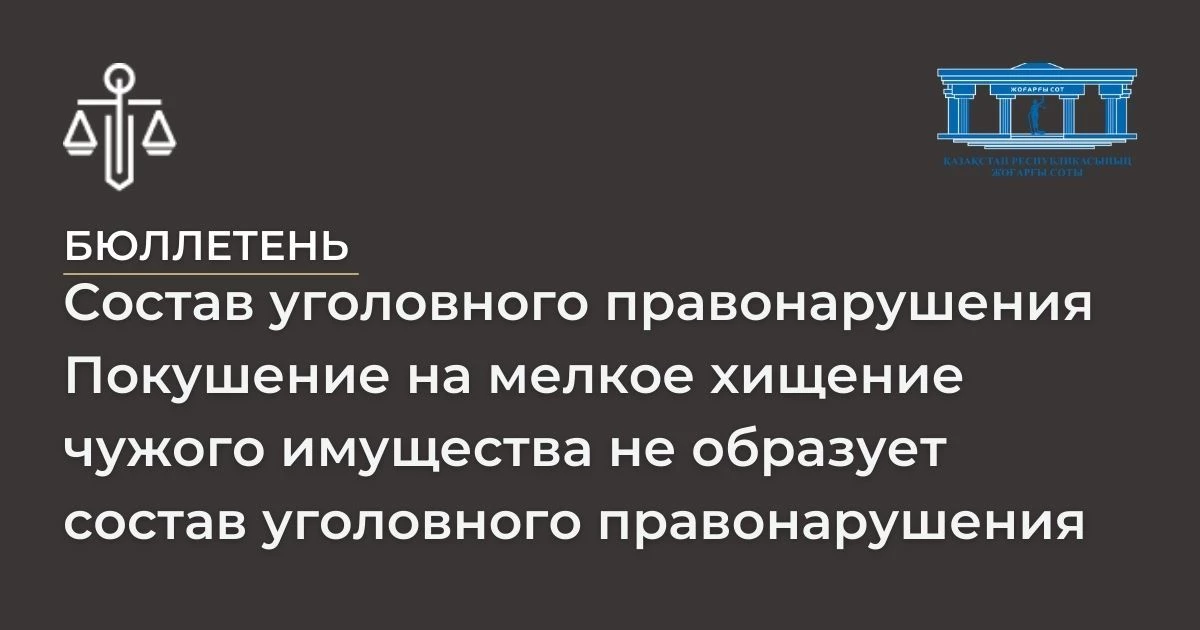The composition of the criminal offense Attempted petty theft of other people's property does not constitute a criminal offense
By a resolution of the Shuisky District Court of Zhambyl region dated March 27, 2017: Sh., who had no previous criminal record, was released from criminal liability under part 1 of Article 187 of the Criminal Code of the Republic of Kazakhstan (hereinafter referred to as the Criminal Code) with the termination of the case on the basis of part 1 of Article 68 of the Criminal Code for reconciliation with the victim and making amends for the damage caused. The court of first instance found that Sh. On March 11, 2017, while in the TD "K" in Shu, he stole one can of condensed milk and one can of stew from the showcase, causing material damage to the victim A. in the amount of 905 tenge. The criminal case was not considered on appeal. In the submission, the Chairman of the Supreme Court indicates that the release of Sh. It is illegal to evade criminal liability in connection with reconciliation with the victim and making amends for the harm caused on non-rehabilitating grounds. Since Sh. was detained at the scene of the offense, what he did constitutes an attempt to commit a criminal offense, for which criminal liability is not provided for by criminal law.
On these grounds, the decision against Sh. is subject to cancellation with the termination of the proceedings in the absence of a criminal offense provided for in part 1 of Article 187 of the Criminal Code. In accordance with part 10 of Article 494 of the Criminal Procedure Code of the Republic of Kazakhstan (hereinafter referred to as the CPC), judicial acts of the first instance are subject to cancellation or amendment if it is recognized that the court has made an illegal and unjustified decision. There are such grounds in the present case. The court's conclusions do not correspond to the actual circumstances of the case, in addition, the court incorrectly applied the criminal law, which led to the illegal termination of the criminal case on non-rehabilitating grounds. In the case, it was reliably established that Sh., having hidden the stolen products in his pocket, tried to escape from the scene without payment. However, being detained by the shopkeeper A., Sh. was unable to carry out his intention. According to article 24 of the Criminal Code, an attempt is an act committed with direct intent, directly aimed at committing a crime, if the crime was not completed due to circumstances beyond the control of the person. Paragraph 7 of the regulatory resolution of the Supreme Court of the Republic of Kazakhstan dated July 11, 2003 No. 8 "On judicial practice in cases of embezzlement" stipulates that theft is considered completed if the property is seized and the perpetrator has a real opportunity to use or dispose of it at his discretion. The Court of Justice of S. They are classified under part 1 of Article 187 of the Criminal Code as a completed criminal offense, whereas the actual circumstances of the case indicate that Sh., being detained at the scene of the offense, did not complete his actions to steal someone else's property due to circumstances beyond his control. Thus, his actions lack the elements of a completed criminal offense, and his act is subject to qualification as attempted petty theft of other people's property. At the same time, according to part 4 of Article 24 of the Criminal Code, criminal liability is imposed only for attempted crimes of moderate severity, serious or especially serious crimes, as well as for attempted terrorist crimes.
What Sh did. It refers to a criminal offense, the attempted commission of which does not entail criminal liability. Thus, in the actions of S. There is no corpus delicti, and the proceedings were to be terminated on this basis. By terminating the proceedings in view of reconciliation with the victim, i.e. on non-rehabilitating grounds, the court of first instance failed to comply with the requirements of the law on the need for a proper legal assessment of the actions of the convicted person and unreasonably worsened his legal situation. In these circumstances, the court's decision regarding Sh. It is subject to cancellation, and the proceedings in the case are terminated due to the absence of S.'s actions. the composition of the criminal offense. The adoption of such a decision entails, in accordance with article 39 of the CPC, recognition of the convicted person's right to rehabilitation in accordance with Chapter 4 of the CPC. Based on the above, the judicial board for Criminal Cases of the Supreme Court overturned the decision of the appellate instance, the proceedings were terminated due to the absence of elements of a criminal offense in his actions, provided for in part 1 of Article 187 of the Criminal Code. In accordance with Chapter 4 of the CPC, it is recognized for Sh. the right to rehabilitation and compensation for damage caused by illegal actions of bodies conducting criminal proceedings. The submission of the Chairman of the Supreme Court of the Republic of Kazakhstan is satisfied.
Attention!
Law and Law Law Law draws your attention to the fact that this document is basic and does not always meet the requirements of a particular situation. Our lawyers are ready to assist you in legal advice, drawing up any legal document suitable for your situation.
For more information, please contact a Lawyer / Attorney by phone: +7 (708) 971-78-58; +7 (700) 978 5755, +7 (700) 978 5085.
Attorney at Law Almaty Lawyer Legal Services Legal Advice Civil Criminal Administrative Cases Disputes Protection Arbitration Law Firm Kazakhstan Law Office Court Cases


